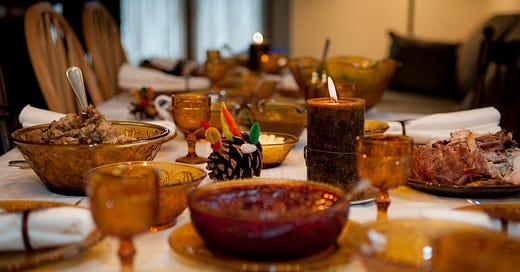Every year around Thanksgiving, I send my students off with some questions to ask a relative. Each year, the questions are different, but the intent is the same: to get them learning family stories, and to have them bring back a story to work with in class.
I always try to ask my relatives the questions too, and I’ve heard many stories because of it. For a long time, after my Grandpa Hall’s hearing made talking on the phone hard, this was a main way we communicated. I’d slow-yell a question about his childhood or his grandparents, and he’d tell me a story. Once, he sang me a song his grandpa, who witnessed the Civil War as a child, used to sing to him. When I go into town, don’t you kick my dog around. It floats through my head on the regular, this song from a man born over 150 years ago.
My daughter just learned to fingerknit yesterday. This morning, she told me she was sad we weren’t in the same generation. Instead of getting too far into how the very premise of generations means we could never be, we talked about how we were like the loops in a chain of fingerknitting, each one emerging from the one before, one long string.
This year’s prompts
This year, I’m having my students ask two questions:
Tell me about a place that is important to you.
Tell me about an event that changed your life.
Back in class
When we get back to class next week, we will tell and write these stories. We’ve been making family trees this year (the information collaged onto gorgeous drawings of trees the students made), so this will go alongside that.
I also had the students write about an object that reminds them of their relative. If time allows, I hope to assemble these three writings into a triptech and display them at our poetry reading. This idea seemed more feasible when I hadn’t noticed how late Thanksgiving was this year, so we’ll see, but I like it, so I hope we pull it off!
A question for any relative
I remember Thanksgiving in 2016, where very liberal relatives and staunchly pro-life in-laws were elbow to elbow around our tiny table, every time things swung towards politics someone would change the subject to sphincters. This sort of sums up my family, but it worked.
This year, should devisive subjects arise, pull out some oral history questions. We assemble our histories, beautiful and terrible, from fragments, and sometimes these fragments give us a way to see the human in even from the hardest relatives.
More than just a way to keep dinner civil, though, family oral histories are a way to honor the extraordinary every day lives of our relatives, and help the younger generation understand that history is made up of many stories, that everyone is an eyewitness, that life isn’t really about big heroic storybook things, but about showing up wherever you are and loving things. It’s important to have a way to be proud of your heritage (and to have some material to interrogate later!), no matter what your family background, and family stories are a piece of that.
My Grandpa is dead now. My daughter never met him, but she will learn some of his stories from me. They will shade in her understanding of her grandpa, of me, and of herself in the context of history.
Want more of my writing?
Oh: I wanted to tell you all, I have another Substack. Notes on Our Mutual Flourishing is a newsletter project exploring my thoughts about just that: how the heck we can all flourish together. It’s a more personal, political, sometimes lyrical and sometimes irreverant space where I write about community, being alive, and falling off my neighbor’s moving truck, among other things. Come on over if you’re so inclined!




